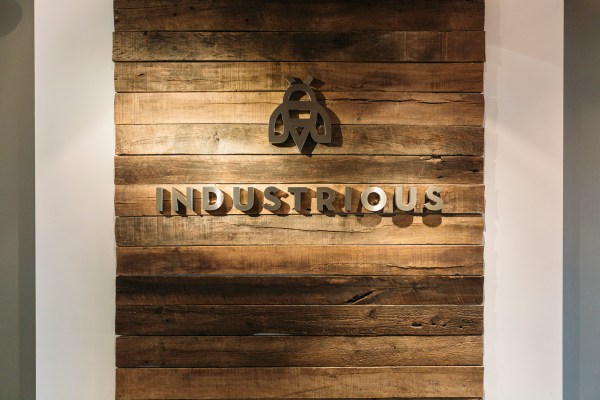Industrious, the WeWork competitor that launched in 2013, is today announcing the close of an $80 million Series C funding round. The financing was co-led by Riverwood Capital and Fifth Wall Ventures.
Industrious thinks of itself as a more premium version of WeWork, offering coworking space and workplace services to some 35 locations across 25 cities nationwide.
“Industrious is high quality, but understated,” said Industrious CEO Jamie Hodari. “We’re purposely understated. We don’t slap the Industrious logo all over everything, so that your company’s brand can shine through.”
In fact, Industrious can offer private entrances, complete with branding, to larger clients in the space. And as it would turn out, larger clients are becoming the name of the game.
Just as WeWork has begun to provide for larger enterprise companies, Industrious is also seeing the industry evolve.
“A year ago, many small businesses and freelancers had moved into a shared, managed workplace setting, and large businesses were just starting their experiment with coworking, asking if they could move a large team into a third-party provider’s space,” said Hodari. “Most major businesses are nearing the end of their first experiment with this, seeing that teams are happier and more productive here.”
Hodari explained that most emerging industries don’t reach a tipping point until they can prove that the outsourced option is better executed than a vertically integrated one. And he believes coworking, and Inustrious in particular, has surpassed that tipping point.
Another large distinction between WeWork and Industrious is the business model. Industrious is moving away from the more capital-intensive real estate leases for new locations to simply partnering with property managers to provide everything from lobby activation and service to office design, workplace services, etc.
Hodari says that the cost of launching new locations has dramatically diminished for Industrious, which leaves some of this new funding for building out the company’s product suite.
Industrious, just like any business in 2018, is highly focused on collecting and collating data on the way that people use their workspace. In short, Industrious wants to give office managers and business leaders the information they need to keep workers happy and productive. For example, the company might discover that casual conference rooms with sofas and comfy chairs are used three times more than formal conference rooms, or that a happy hour with wine and liquor sees far higher attendance than one where only beer is served.
“To an outsider, living in a world of virtual reality and AI, this might seem boring,” said Hodari. “But for most American businesses that is a transformative piece of data. It’s not about using space more efficiently to save money, but rather about using it more efficiently to drive the types of spaces that people actually want to use throughout the day.”
Collecting and analyzing that data is not as simple as throwing up a few sensors, and Industrious is committed to building out an infrastructure that supports data analysis in the long term.
Hodari says that he thinks of Industrious as a subscription business, which means that the metric he cares about the most is churn. He added that Industrious has a net negative churn overall.
Industrious won’t share specific numbers on how many clients it has, but did admit to serving big name clients such as Chipotle, Full Screen, Hyatt, and Instacart.
The company has raised a total of $142 million in funding.
